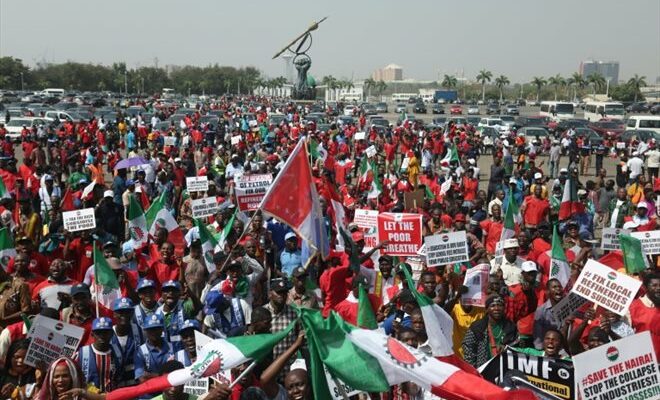A woman buys fruit at a market in Lagos, March 8, 2024 in Nigeria (AFP/Benson Ibeabuchi)
“Ramadan hasn’t started yet and some people are already fasting because they can’t afford to eat. Everything is expensive right now,” laments Owoyemi Sherifent Mojisola, 54, before heading to the central mosque. from Lagos to Nigeria.
Worshipers rush inside the place of worship, which overlooks Nigeria’s economic capital, to perform the last Friday prayer, before the start of the Muslim holy month of fasting.
In Africa’s most populous country, 50% of which are Muslims, galloping inflation is approaching 30% on the eve of Ramadan scheduled for next week, according to figures from the national statistics office.

A seller carries a bin of dried fish at the Lagos market, March 8, 2024 in Nigeria (AFP/Benson Ibeabuchi)
A situation which pushes the most modest to give up foods now considered luxury products such as meat, eggs, milk and fruit.
“I have never before bought an orange for 200 naira (0.11 euros) or 300 naira (0.17 cents). A pineapple is worth 500 naira (0.29 euros) today, we can no longer buy some. A few months ago, a pineapple was worth 100 naira (0.057 euros) or even 50 naira (0.029 euros),” explains Ms. Sherifent Mojisola.
This clothes seller is worried that she will no longer be able to feed her three children with her meager salary of less than 90,000 naira per month (or 52 euros).

Customers buy trays of food at a market in Lagos, March 8, 2024 in Nigeria (AFP/Benson Ibeabuchi)
The end of fuel subsidies and currency controls decided by President Bola Tinubu upon his arrival at the head of Nigeria in May 2023, tripled fuel prices and led to an overall increase in the cost of living in the country. .
The Nigerian president has repeatedly called on his compatriots to be patient, saying his reforms will help attract foreign investors and revive the economy, but the positive effects of these economic reforms are slow to be felt. after the criticism.
– Food insecurity –
“People are committing suicide just because of inflation, they can no longer feed their families. It’s really hard,” laments Idihabom Nafisah Oyebanji, her head covered with a pink veil.

A woman in front of the mosque in Lagos, March 8, 2024 in Nigeria (AFP/Benson Ibeabuchi)
For this 42-year-old mother who came to the central mosque of Lagos accompanied by her friends, this month of Ramadan promises to be more difficult than the previous one, already marked by the economic crisis.
“We liked to buy milk, melon, jam… We can no longer buy them” confides Ms. Oyebanyi who will now be content with “pap, a pudding made from cereals, dates and rice” when breaking the fast .
Rising food prices also put traders in a difficult situation.

A seller prepares a pasta dish for customers at a market in Lagos, March 8, 2024 in Nigeria (AFP/Benson Ibeabuchi)
“I sell prepared meals with a choice of rice, pasta, plantains, fish, sometimes meat and vegetables. But soon I will no longer be able to buy pasta because the package cost 500 naira (0.29 euros) is now at 1,000 naira (0.57 euros)” explains Simiat Muhammad on the large market set up near the mosque.
For several months, she has felt “obligated to accept credits from her customers” who can no longer afford her dishes.
A few meters further, Azeez Shelifiu in his long blue djellaba makes the same observation.
“People no longer have money to pay for small pleasures for Ramadan like my incense. Nigerians no longer buy, or ask for credits” explains the 31-year-old young man, whose monthly income has increased from 60,000 (35 euros) to 40,000 naira (23 euros) in less than six months.
Food insecurity sweeping across Nigeria led to the looting of a local government warehouse in Abuja in early March, where a crowd took away bags of cereals, prompting Nigeria’s National Emergency Management Agency to ( NEMA) to enhance safety.
In Africa’s largest economy, at least 63% of Nigerians live in extreme poverty, according to official figures.

Demonstration against the high cost of living and poverty in Abuja, February 27, 2024 in Nigeria (AFP/Archives/Kola Sulaimon)
This scene of looting took place only a few days after national demonstrations against the high cost of living organized by the Nigeria Labor Congress (NLC) trade union confederation, bringing together several thousand demonstrators, at the end of February.
Faced with the difficulties linked to the economic crisis, the imam of the central mosque of Lagos Sulaiman Oluwatoyin Abou-Nolla calls for solidarity.
“We must support each other especially during this period of Ramadan,” the imam, who plans food distributions during the month in the mosque, told AFP.
© 2024 AFP
Did you like this article ? Share it with your friends using the buttons below.




